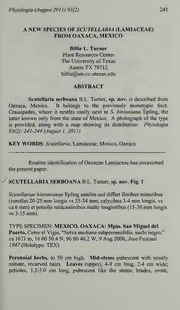
A new species of Scutellaria (Lamiaceae) from Oaxaca, Mexico PDF
Preview A new species of Scutellaria (Lamiaceae) from Oaxaca, Mexico
Phytologia (August2011) 93(2) 241 A NEW SPECIES OFSCUTELLARIA (LAMIACEAE) FROM OAXACA, MEXICO Billie L. Turner Plant Resources Center The University ofTexas Austin TX 78712 [email protected] ABSTRACT Scutellaria serboana B.L. Turner, sp. nov. is described from Oaxaca, Mexico. It belongs to the previously monotypic Sect. Crassipedes, where it nestles easily next to S. hintoniana Epling, the latter known only from the state ofMexico. A photograph ofthe type is provided, along with a map showing its distribution. Phytologia 93(2): 241-244 (August 1, 2011) KEY WORDS: Scutellaria, Lamiaceae, Mexico, Oaxaca Routine identification ofOaxacan Lamiaceae has occasioned thepresentpaper. / SCUTELLARIA SERBOANA B.L. Turner, sp. nov. Fig. 1 Scutellariae hintonianaeEpling similes sed differt floribus minoribus (corollas 20-25 mm longis vs 33-34 mm; calycibus 3-4 mm longis, vs ca 6 mm) etpetiolis midcaulinibus multo longioribus (15-30 mm longis vs 3-15 mm). TYPE SPECIMEN: MEXICO. OAXACA: Mpio. San Miguel del Puerto, Cerro el Vigia, "Selva mediana subperennifolia. suelo negro." ca 1671 m, 16 00 50.4 N, 96 0646.2 W, 9 Aug 2006,JosePascual 7947(Holotype: TEX). Perennial herbs, to 50 cm high. Mid-stems pubescent with mostly minute, recurved hairs. Leaves (upper), 4-9 cm long, 2-4 cm wide; petioles, 1.5-3.0 cm long, pubescent like the stems; blades, ovate. 242 Phytologia (August2011) 93(2) glabrous above and below, or nearly so, the margins irregularly crenulate. Capitulescence a short terminal raceme of 4-6 paired flowers, the axis glandular-pubescent, bracteate with persistent ovate mm mm bracts 2-3 long. Pedicels 3-4 long. Calyces (flowering) 3-4 mm long, pubescent with both glandular and non-glandular, recurved mm hairs. Corollas reportedly "guinda," 20-25 long, moderately mm mm pubescent externally, upper lip ca 5 long, lower ca 2 long, the mm mm tube ca 23 long, markedly flared upwards, ca 8 wide at the orfices. Stamens 4, scarcely exserted, ifat all, the upper anthers ca 1 mm long. Nutlets not observed. The species name is an acronym ofthe Socieda para el Estudio de los Recursos Bioticos de Oaxaca (SERBO). This organization has helped fund the collection ofnumerous plants from the area concerned. The novelty apparently belongs to the previously monotypic Sect. Crassipedes, as delimited by Epling (1939). Paton (1990), after a cosmopolitan study, redefined Scutellaria, positioning S. hintoniana within his broad concept of Sect. Scutellaria, treating this as the only member of his "5". hintoniana species-group" (13), noting its relationship to the ''S. caerulea species-group (16). ACKNOWLEDGEMENTS My colleague, GuyNesom, providedthe Latin diagnosis, and reviewedthe paper, forwhich I am grateful. The distribution map (Fig. 2) is basedupon specimens on file atTEX. LITERATURE CITED Epling, C. 1939. A revision ofSalvia, subgenus Calosphace. Feddes Report. Spec. Nov. Beih. 110: 1-388. Paton, A. 1990. A global taxonomic investigation ofScutellaria (Labiateae). Kew Bull. 45: 399-450. Fig. 1. Scutellaria serboana (Holotype: TEX). 244 Phytologia (August2011) 93(2) Fig. 2. Distribution ofScutellaria hintoniana and S, serboana.
